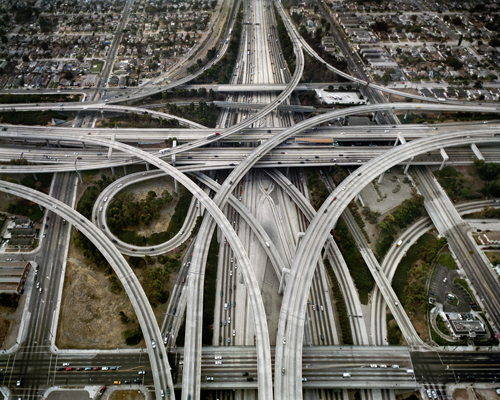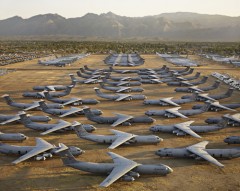
Highway #1, Intersection 105 & 110, Los Angeles, California, USA, 2003. Chromogenic color print. Photograph © Edward Burtynsky
Thankfully for those of us in D.C. who love art, especially those with a particular fondness for photography, we have Paul Roth and the Corcoran Gallery of Art. Over the past couple of years they’ve had an amazing lineup of photography exhibits, showcasing a dream team of photographers including Annie Leibovitz, Richard Avedon, Ansel Adams, and William Eggleston. All known for completely different styles of photography (although it has been argued that Leibovitz is “copycatting Avedon“), there’s been a genre on display for everyone. Continuing their record of hosting world class and historically important photography exhibits, the Corcoran opens Edward Burtynsky: Oil on Saturday.
I don’t read art magazines. I don’t read art blogs or subscribe to their RSS feeds. I don’t have a degree in art history and I’ve never taken a photography class. I prefer to learn about art by experiencing it first hand, by learning about it from others, or by pure coincidence. About a year ago I was adding movies to my Netflix queue when I came across a documentary called Manufactured Landscapes. I had never heard of Edward Burtynsky but was enticed by the description of this film about “an examination of industrialization and globalization”, a concept that has always been interesting to me as I tend to look at things from a 10,000 foot point of view. Needless to say that when I watched this documentary I was immediately a fan of Burtynsky’s, not necessarily for his photographic abilities, but for what he was interested in showing his audience. Leibovitz can show you glamorous photos of Angelina Jolie with perfect lighting and makeup, but no matter how impressive they may be, you are only left with feelings of lust or admiration. On the other hand, when you see Burtynsky’s photo of three Bangladeshi men standing barefoot in a pool of oil, you are left with feelings of wonder, with sorrow, with relief that you have a desk job. Burtynsky’s photos are not only beautifully executed pieces of art, but they make you think and want to know more, which takes his photography to the next level.
Continue reading →

